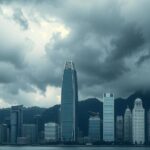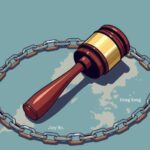Politics
AP, ASIA, BEIJING, BIDEN ADMINISTRATION, CHINA, COMMITTEE FOR SAFEGUARDING NATIONAL SECURITY, DONG JINGWEI, FI, HONG KONG, KIN CHEUNG, LEGAL, MARGARET CHIU, MEXICO, NATIONAL SECURITY, NORTH AMERICA, RAYMOND SIU, S. STATE DEPARTMENT, SECURITY OFFICE, STATE DEPARTMENT, TAIWAN, TERRITORIAL DISPUTES, U. S, UNITED STATES, US, WASHINGTON
Omar El-Sharif
U.S. Sanctions Hong Kong Officials Amid Erosion of Autonomy; China Vows Retaliation
The U.S. has sanctioned six Chinese and Hong Kong officials for their involvement in actions that threaten Hong Kong’s autonomy. Among those sanctioned are Justice Secretary Paul Lam and Police Commissioner Raymond Siu. The sanctions are expected to exacerbate existing U.S.-China tensions. In retaliation, China has threatened countermeasures, asserting its legal authority to act against pro-democracy activists abroad.
The United States has imposed sanctions on six officials from China and Hong Kong for their roles in undermining Hong Kong’s autonomy and participating in acts of “transnational repression.” Among the sanctioned officials are Justice Secretary Paul Lam, police commissioner Raymond Siu, and security office director Dong Jingwei. This action is expected to escalate tensions between the U.S. and China, which are already strained due to various geopolitical issues.
According to the U.S. State Department, these officials have been involved in coercing and detaining individuals under Hong Kong’s national security law. The sanctions specifically address the intimidation of pro-democracy activists, many of whom have fled abroad, including U.S. citizens and residents. The remaining officials affected include Sonny Au, Dick Wong, and Margaret Chiu.
Hong Kong’s national security law, imposed by Beijing in 2020, has led to the prosecution of numerous activists and has drawn international condemnation for violating the promises made during the 1997 handover. The law has been criticized for its extraterritorial effects, which authorities have used to seek the arrest of activists abroad, offering significant rewards for information leading to their capture.
In response to the U.S. sanctions, the Hong Kong office of China’s foreign ministry condemned the actions as an attempt to undermine the city’s stability and called for Washington to cease its interference. Chinese Foreign Ministry spokesperson Guo Jiakun emphasized that China’s actions against activists escaping to foreign jurisdictions were legal and warranted.
The Hong Kong government denounced the United States, asserting that the accusations of “absconding” activists are grounded in their engagement in activities that endanger national security. Furthermore, Justice Secretary Paul Lam stated that the sanctions would not impact his work or life, deeming them a form of “tyrannical bullying.”
Frances Hui, an overseas-based activist, expressed that the sanctions could signify a beneficial shift towards accountability for the crackdown in Hong Kong, mirroring similar sanctions imposed during prior U.S. administrations for actions undermining the region’s autonomy and democratic freedoms.
The recent U.S. sanctions against six officials signify continued international involvement in Hong Kong’s political issues, as well as rising tensions between the United States and China. The scrutiny regarding Hong Kong’s autonomy and the implications of its national security law remain contentious points of debate within the global community. While the U.S. justifies the sanctions as a stand for human rights, Chinese authorities continue to defend their legislative actions as necessary for stability. The impacts of this diplomatic conflict will likely influence not only Hong Kong’s political landscape but also its relationship with the U.S. and other nations in the future. The ongoing escalation between these powers underlines the importance of dialogue and potential avenues for resolution.
Original Source: apnews.com








Post Comment